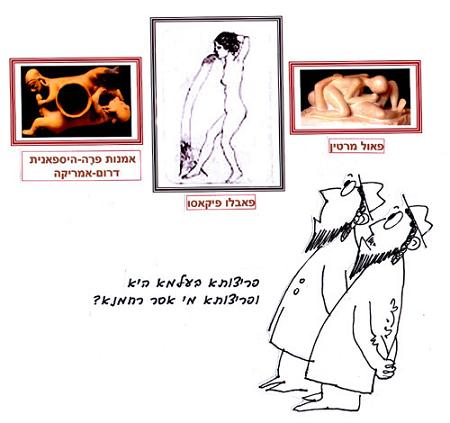
It is Chazal’s way to discuss and explain verses, and from these explanations they draw Halachic conclusions. Thus, for example, in the case of a sotah (a married woman whose husband suspects her of adultery; she must go to the Holy Temple for investigation of the truth of her husband’s suspicions). It is written in the Torah “And a man has known her carnally and she keeps secret the fact [from her husband]” (Numbers 5:13).
The Talmudic Sages try, each in his own way, to explain why the Scriptures used the word carnally.
Rav Sheshet suggests that the Scriptures meant to exclude a case in which the husband suspects the woman had anal intercourse with another man. In the opinion of this sage, if one suspects his wife is guilty of extramarital anal intercourse, this suspicion is not investigated.
A Babylonian sage named Abaye suggested that the Scriptures meant to exclude a husband who suspects his wife of adultery through less than full penetration, that the man with whom she was having relations only inserted the glans of his penis into her vagina. In such a case, according to Abaye, when a husband suspects his wife of external but not full penetrative sexual intercourse, there is no need to investigate the suspicion.
A different Babylonian sage, Rava, suggested that the Scriptures meant to exclude a husband who suspects his wife of nude bodily contact with another man, with no penetration at all. According to this sage, if one suspects his wife of unclothed contact with another man, there is no need to investigate this suspicion.
(Babylonian Talmud, Tractate Sotah 26b)
The Talmudic text:
What is the purpose of “carnally”? It is required for this teaching: “Carnally” to the exclusion of something else. What does “something else” mean? Rav Sheshet said: It excludes the case where he warned her against unnatural intercourse. Rava said to him, unnatural intercourse? It is written (Leviticus 18): “As lying with womankind”! But, said Rava, it excludes the case where he warned her against contact of the bodies. Abaye said to him, That is merely an obscene act, and did the All-Merciful prohibit [a wife to her husband] for an obscene act? But, said Abaye, it excludes the case where he warned her against external contact. This is quite right according to him who maintains that by sexual contact is to be understood insertion inasmuch as external contact is not regarded, and consequently the Scriptural phrase is intended to exclude the latter; but according to him who maintains that sexual contact is the external contact what is there to say? Certainly he warned her against contact of the bodies; and should you argue that the All-Merciful made it depend upon the husband’s objection, behold the husband did object, therefore he informs us [that the phrase “carnally” is to exclude this].
